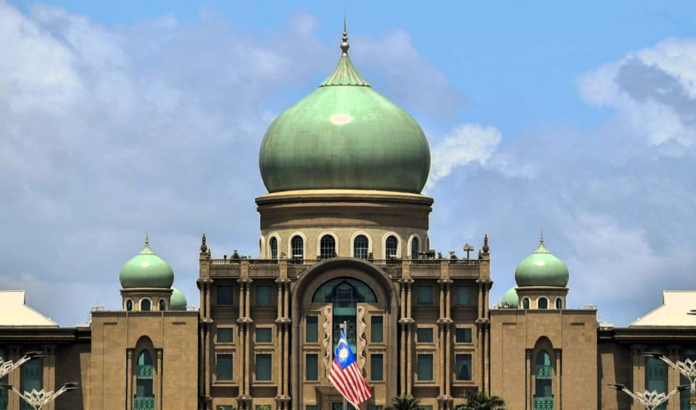
KUALA LUMPUR – The government’s claim that proceedings and information concerning the Pardons Board are fully governed by the Official Secrets Act (OSA) 1972 has prompted more questions from the legal fraternity over the royal addendum purportedly allowing former prime minister Datuk Seri Najib Razak’s home imprisonment.
Legal practitioner GK Ganesan Kasinathan highlighted that while it remains “unclear” when the board’s meeting minutes were declared confidential under the OSA, such stipulations could be waived in the interest of public benefit.
Asserting that the board itself could also waive such confidentiality, which might be “difficult to justify” if challenged, he expressed concerns over the recent matter sending a “wrong message” to the public.
“There is no law forbidding the disclosure of details on the board’s proceedings (as) it is a constitutional body under Article 42 of the Federal Constitution and has a duty to act transparently,” he said when contacted by Scoop.
“(Citing the confidentiality of the board’s proceedings under the OSA) could lend to the perception that the government is utilising an act of Parliament to shield a constitutional body from legitimate queries.”
Stressing that the exercising of constitutional powers requires elements of visibility, honesty and integrity, he pointed out that in Malaysia, the Federal Constitution ranks higher than the laws of Parliament.
As such, he argued against utilising a parliamentary law like the OSA to “shield” the board, cautioning that if such a law is used to justify a possibly non-constitutional act, a court might have grounds to declare the move unconstitutional.
He also raised concerns over whether the use of the OSA could result in the possible silencing of lawmakers’ voices in the Dewan Rakyat, saying: “Sweeping such a sore thumb under the carpet will not help the rakyat understand”.
Additionally, Ganesan expressed worries over the supposed use of ancient feudal customs, which have historically assumed that ‘the King can make no error’, as a tool to justify constitutional interpretations.
“We don’t need to know all the time why (the board) makes the decisions that it does. But now, since there is a dispute on the existence of the addendum and questions have been asked, the board has the option to tell the public whether certain claims are right.
“Merely denying the addendum’s existence only adds gristle to the conflagration and smoke,” he added.
In a January 8 piece published on the “Paradox: Legal Issues Simplified” blog, Ganesan discussed the matter of the alleged royal addendum while urging for the government to disclose the Board’s meeting minutes on the matter to “eliminate unnecessary speculation”.
“Did the Pardons Board discuss or decide on Najib’s house arrest? The board’s minutes would answer the question, (but) we don’t have it…It’s not an ‘official secret’ and why should it be? It has nothing to do with national security.
“In the interest of transparency, there is all the more reason that such information should come before the public,” he wrote.
Similar calls were also made by several other quarters, following which Federal Territories Minister Dr Zaliha Mustafa said that the confidentiality of the board’s meeting minutes prevents it from being disclosed to the public.
On January 10, the Legal Affairs Division (BHEUU) of the Prime Minister’s Department revealed that proceedings and information concerning the Pardons Board are subject to the OSA.
BHEUU, acting as the secretariat for the Pardons Board for the Federal Territories of Kuala Lumpur, Labuan, and Putrajaya, said this means that all related documents are accessible only to the board members and individuals authorised directly by the board.
“No other parties, regardless of position or rank, have access to these documents, in accordance with the principles of confidentiality and integrity,” the division said in a statement.
Meanwhile, lawyer Datuk Seri Jahaberdeen Mohamed Yunoos opined that the Pardons Board’s deliberations ought to be secretive and only available to authorised persons to maintain the board’s integrity.

Speaking to Scoop, he noted that such confidentiality would also ensure that the board is free to deliberate, discuss and decide on relevant matters without any fear or favour.
“The board is not required to give any reasons or justifications under the law for the decisions it determines as it is the prerogative of the Yang di-Pertuan Agong,” he added.
The issue surrounding the alleged royal addendum first emerged last year, when former Barisan Nasional chairman Najib hauled the government and several other respondents to court in a judicial review bid seeking confirmation on the document’s existence and its enforcement.
High court judge Datuk Amarjeet Singh had previously ruled that the four affidavits supporting Najib’s claim, including one from Umno president and deputy prime minister Datuk Seri Ahmad Zahid Hamidi, were hearsay and inadmissible.
Following the Court of Appeal’s split decision allowing the bid to return to the lower court, the matter gained renewed attention, with accusations directed at the government for allegedly “hiding” the supposed addendum.
Yesterday, Prime Minister Datuk Seri Anwar Ibrahim refuted such claims, asserting that the alleged additional order was never raised during the Federal Territories Pardons Board meeting last year.
Stressing that the addendum was never part of the meeting’s agenda, Anwar also said that he had chosen to not comment on the issue earlier as it involved the royalty. – January 12, 2025



